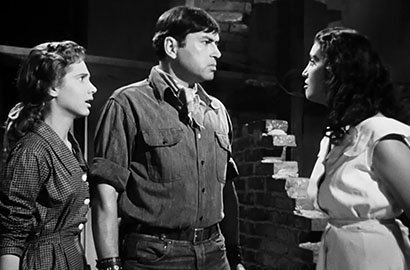Achtung, veränderte Öffnungszeiten! Alle Veranstaltungen ab Dezember 2022 beginnen um 20 Uhr!
In
der „Lecture & Film“-Reihe Kino am Abgrund der Moderne führen
namhafte Expert:innen aus Europa und den USA in die vielfältigen
Facetten von Buñuels Werk ein.
Termin: Donnerstag, 27. April 2023, 20 Uhr im Kino des DFF
Film: EL BRUTO, Mexiko 1953, 83 Min.
Lecture: Gaston Lillo (Ottawa), Melodrama in El Bruto: An Aesthetics of AstonishmentVortrag in französischer Sprache mit Übersetzung
Among
the roughly twenty films that Buñuel made during the course of his
Mexican period, some, like LOS OLVIDADOS (1950), EL ÁNGEL EXTERMINADOR
(1962) and NAZARÍN (1959), have enjoyed a positive critical reception
and won international prizes, contributing to the director’s prestigious
image. However, other films from this time, such as EL GRAN CALAVERA
(1949), SUSANA (1951) and EL BRUTO (1953), were considered as films made
“for pecuniary reasons”, containing “inexplicable concessions” and
“without great aesthetic interest”. On the basis of the reevaluation
which the melodrama has undergone in recent years (thanks in part to the
writings of Peter Brooks) and the growing theoretical interest in the
importance of the affective dimension of texts, I will show how EL BRUTO
uses the narrative and thematic resources of the melodrama outside of a
pejorative, mocking ethos, typical of irony, while pointing towards an
ethical and ideological horizon contrary to that which characterized the
Mexican melodrama films of the era. At the same time, I will show that
the film, through its “emotional pull”, activates mechanisms of
subjectivation which distance it from the subjective interpellation of
the then dominant Mexican discourse.
Gaston Lillo is professor of modern languages and literatures at the University of Ottawa.





